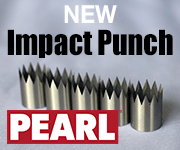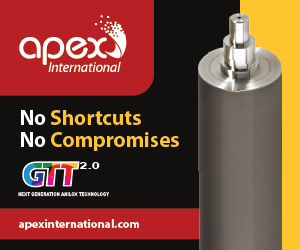Color Control
- Published: January 01, 2009, By By Edward Boyle, Contributing Editor
Independent Printing Co. (IPCO), Martinez, CA, may be just two years shy of its 100th Anniversary, but this is one label converter/commercial printer that simply refuses to grow old gracefully. In August 2007, for example, at its Ashland, OR, plant, the company installed the first six-color Heidelberg Speedmaster XL 105 press in the northwestern US, allowing it to maintain its reputation as one of a handful of the nation's premiere in-mold label (IML) converters.
“As a family-owned and -operated company, we are very proud of our four-generation history and heritage, as well as the quality of work we produce for our customers,” says president Kurt Brombacher. “Our new XL 105 enables us to provide even better service to our customers while maintaining our standards for the highest quality.”
The XL-105 is one of the most advanced offset presses Heidelberg has ever manufactured, the company reports. The press uses water-based inks and prints at speeds to 18,000 sheets/hr with extended delivery.
Brombacher says the new press has enhanced IPCO's ability to convert film-based in-mold labels — its premiere packaging niche — particularly with the Heidelberg Image Control system that automatically adjusts color to match a previous press run and keep color consistent throughout the run. This feature cuts makeready time and reduces waste. The result, says Brombacher, is the exceptional quality with quicker turnaround time required by the blow molders that ultimately must apply the labels.
“Color consistency throughout a run is extremely important to us and our clients,” Brombacher said. “They require a broad range of printed materials, and we use Prinect Image Control to ensure that brand colors are consistent throughout the job, from the computer screen through customer delivery.”
Prinect Image Control automatically evaluates “mini spots” during production and corrects any tonal and color discrepancies in the prepress stage, making it simple to stabilize tonal values and control overall image quality, notes Brombacher. “We rely heavily on Prinect Image Control as our central measuring system for standardized color measurements and use Prinect Prepress Interface for seamless workflow across the shop,” he explains. “Overall, our makeready time and production speeds are enhanced because of the Prinect workflow software.”
In addition to the XL 105, IPCO runs two other Heidelberg presses, including a four-color Printmaster GTO 52 and five-color Speedmaster CD 102 perfector with coating unit. The company uses Heidelberg Saphira Perfect Dot Blankets, which are one piece of a full line of Heidelberg Saphira consumables available. The company produces general commercial materials as well as packaging, from artwork to finishing.
No Tolerance for Defects
Brombacher notes the ability to deliver defect-free in-mold labels is particularly critical to the blow molders that operate on high-speed production lines with little tolerance for label defects and application problems. He adds that IPCO's 15 years of experience converting in-mold labels is well beyond the “learning curve” that can be a serious barrier to entry for companies interested in entering the marketplace.
“If you talk to the blow molders, there really are a handful of IML printers that they want to deal with,” says Brombacher. “It's not only that you have to learn to print on different IML substrates, but a lot of it has to do with the coatings, the inks, how you package it, how you cure it. It's pretty complicated, and the in-mold companies want a printer who gives them a sheet that will perform well in their facilities.”
“It's a whole system of package production,” adds Brombacher. “We're a team, and that really has to go all the way down the line with our suppliers. We've got very long relationships with these companies. It makes it an enjoyable day to go to work when you've got people that have your back and appreciate that you do.”
Brombacher says IPCO's customer base is evenly divided between label converting and commercial printing, which includes annual reports, brochures, and the like. Its in-mold customers are concentrated in the food, beverage, retail, and lawn maintenance industries.
The company is able to convert all types of substrates, including papers, films, and foils. Its Heidelberg offset presses give IPCO an advantage, says Brombacher, in meeting the needs of its commercial printing and in-mold customers.
“A lot of our challenge is that we print on so many different substrates,” explains general manager Alan Pittman. “It's not like some of these printers who are printing on an offset coated sheet. We've got all these different substrates that we've got to build the curve in for our color work and our different kinds of inks.”
“It's fun to solve our customers' problems,” says Brombacher, who notes that some customers have been with IPCO for more than 60 years. “We're not afraid of the different types of substrates — papers, foil, plastics. We take it as a challenge. And, of course, the goal is to have customers who appreciate that and treat you as one of their team.”
Static Is an Issue
Brombacher notes one of the greatest difficulties in producing sheet-fed film labels is controlling static, which can wreak havoc on its presses and PMC die-cutters. The company has managed to overcome those inherent difficulties by employing static controls throughout the press, adding Heidelberg's plastic kit for the Preset Plus Feeder and Delivery, with ultrasound sheet travel sensors for transparent substrates.
Also, IPCO primarily uses Yupo synthetic papers that perform like paper on press but have all the desired qualities of a film. The base and surface layers of Yupo synthetic papers are formed during the extruding process, and these three layers are stretched to create a dimensionally stable, biaxially oriented substrate. The innumerable micro-voids created through this process give the substrate its superior strength, opacity, and ultra-smooth surface finish.
“We used to print a lot of laminated foil for a customer,” says Brombacher. “In doing that, we learned very quickly about running humidifiers and controlling our environment in the pressroom and throughout the plant.” IPCO uses Bahnson humidifiers from DnB Humidifer Mfg.
“When you're running on so many different substrates,” he adds, “static can really raise holy heck with you. We try to buy substrates from companies that really understand their product so they don't give us something that's full of static either.”
Efficient Prepress
Brombacher says one of the reasons IPCO is able to meet its customers' exacting demands for both quality and service is its seven-person graphic arts department, which not only produces the files for the hundreds of jobs completed by the company each month but also prepares artwork for other converters. Brombacher says the company is upgrading its equipment and software continually to maintain compatibility with its fellow converters, as well as its own customers. “It's a constant expenditure,” says Brombacher. “But it's also a strength.”
The centerpiece of IPCO's prepress department is a Kodak Prinergy workflow system, which provides fast and accurate control over color separation and trapping, automates repetitive daily tasks, enhances print quality, cuts costs, reduces errors, and improves efficiency. It presents a unified view into the production of each print job for quick assessment of status, history, and any holdups to completion. IPCO's prepress equipment also includes a seven-color, 44-in. Epson 9600 digital printer, a Kodak MPI proof controller, and a 40-in. Creo (Kodak) Trendsetter 800 Quantum platesetter.
“We service many well-known national brands that expect their products to be consistent in color and overall production,” Brombacher said. “We have had some of our largest clients for many years, and some have just come on board. We treat all of our customers with the same service now as when my father ran IPCO, and our relationship with Heidelberg helps us continue the level of excellent service that our customers expect.”
Supplier Info
-
Heidelberg Inc. | www.heidelberg.com
PFFC-ASAP 309 -
PMC Printing Machinery Co. | www.pmcworldwide.net
PFFC-ASAP 310 -
Yupo Corp. | www.yupo.com
PFFC-ASAP 311 -
DnB Humidifer Mfg. Inc. | www.dnbhumidifiers.com
PFFC-ASAP 312 -
Kodak/Creo | www.kodak.com
PFFC-ASAP 313 -
Epson | www.epson.com
PFFC-ASAP 314
Contributing Editor Edward Boyle, based in Reading, PA, has covered the converting industry for more than 24 years. Contact him at EJB Communications; 610-670-4680; ejbcomm@aol.com.
Converter Info
-
Independent Printing Co. | 3930 Pacheco Blvd., Martinez, CA 64553 | 925-229-5050 | www.ipcoprinting.com
Word-of-Mouth Business
IPCO's president, Kurt Brombacher, says his company is in the enviable position of being recommended by existing customers to potential label buyers in what is essentially a very small marketplace. Blow molders of plastic containers for the petroleum industry, for example, not only are looking for high quality labels that can maintain their integrity in sometimes harsh environments but also can be seamlessly applied.
“Let's say that we supply labels to canister suppliers, or we're dealing with toll packers who are filling apple juice or chemicals,” suggests Brombacher. “They're looking to cut costs at their plants, so they want labels that run well and deliver on time, so they're recommending us more than ever. It's been rewarding for us to find that these manufacturers and suppliers are recommending us. It makes you feel good, because they go in and sell the whole package, and some of them are including us in it.”












